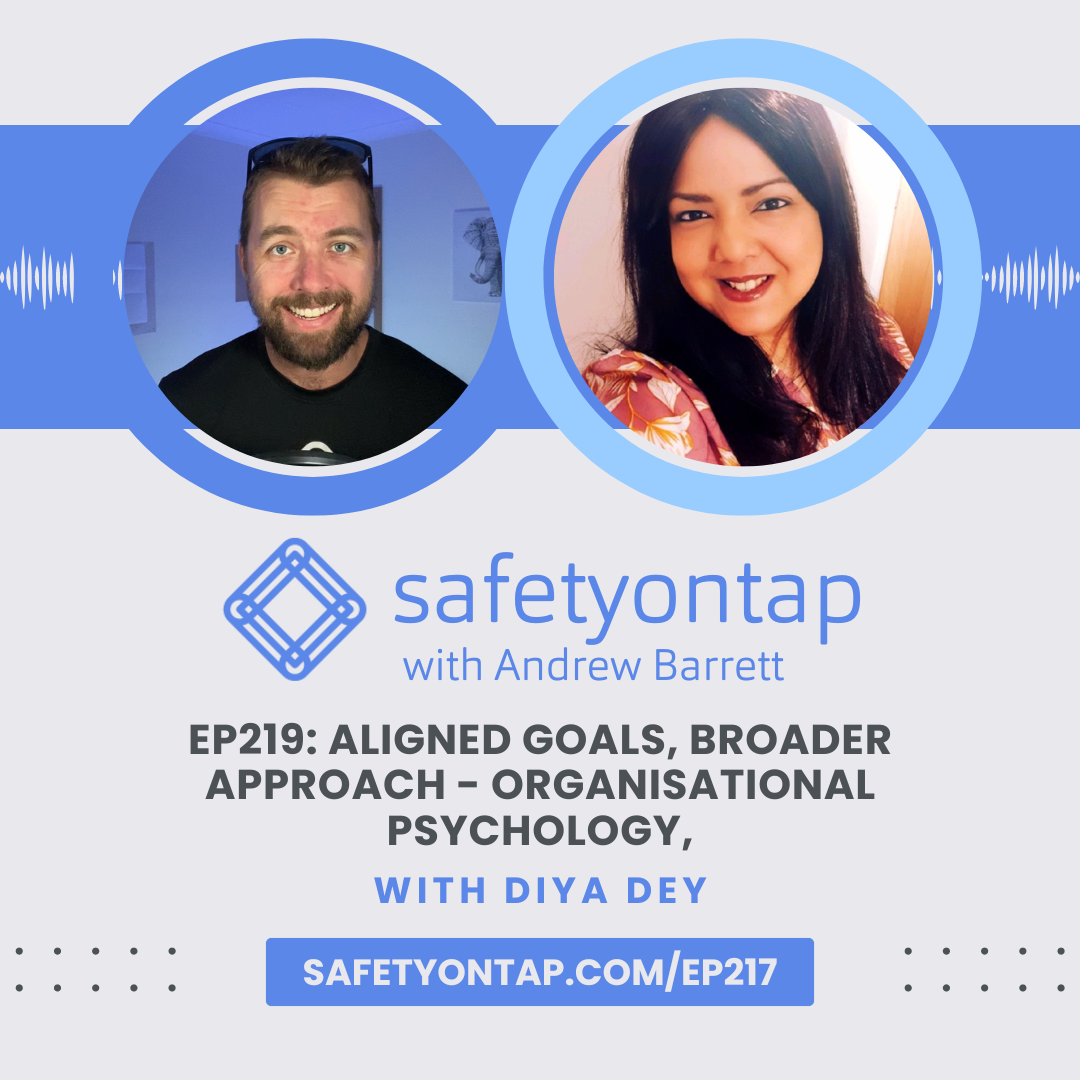Have you ever had an idea, or heard an idea, thinking it was brilliant, only to realise that the idea is not that new, and didn’t come from where you thought it did? Welcome to the discipline of organisational psychology.
Hey, it’s Andrew, and this is Safety on Tap.
Since you’re listening in, you must be a leader wanting to grow yourself and drastically improve health and safety along the way. Welcome to you, you’re in the right place. If this is your first time listening in, thanks for joining us and well done for trying something different to improve! And of course welcome back to all of you wonderful regular listeners.
Industrial and organisational psychology, or IO psych as it is often called, is well over 100 years old. It was labelled as the exploration of ‘real life’ psychology. It’s official birth is suggested to be 1913, with the publication of the first text on the subject called Psychology and Industrial Efficiency, by Hugo Munsterberg.
How is it that such a field, with 100 years of history and research and development, is not that familiar to most of us working in health and safety?
Well today I hope that will change just a little, as I dialogue with Diya Dey, an organisational psychologist based in Melbourne Australia. Diya has experience in both consulting and working in-house, and is currently in a organisational psychology role focussed on organisational wellbeing in the Victorian State Government.
When I first met Diya, I found her curious, and generous. A great combination in my book, so it was only natural that I would invite her into a conversation with the Safety on Tap community about how industrial and organisation psychology relates to, and can enhance, work health and safety.
Here’s my conversation with Diya Dey:
I should have clarified this at the start – we talked quite a number of times about ‘systems’. If you’re relatively new to the podcast, you may not know that when we talk about systems, we aren’t talking about Safety Management Systems in the ISO45000 sense, we are talking about little s systems, which is the catch-all to describe all the stuff around us – the organisation is part of the system, as is the marketplace, your customers, the employees and contractors, the government and regulators, they are part of the system. What makes the system the system, is the interactions between the parts. So work, as you know it in your organisation, is a collection of individuals, often organised in teams, interacting with each other, with information, and raw materials, and means of production, to achieve the objectives of your organisation.
That’s what we mean when we talk about systems. And yes, our safety systems are part of the overall system, but it’s only a very small part.
Here’s my three takeaways from my chat with Diya Dey:
Takeaway #1: Diya gave us some great framing we can use in our day to day work. She described looking through three perspectives – the individual, the interpersonal, and the systems level. How might you see new risks and opportunities if you take that approach? Where are you currently zoom into, what perspectives are you missing or not engaging with?
Takeaway #2: Where are the industrial or organisational psychologists around you? Like Diya said that might not be their job title, but they might be in the cubicle around the corner or the office in the next city. Why not make some enquiries, starting with your HR and, if you have one, your change management office, to find out if they are there, and what are the working on? You might find yourself someone willing and keen to share what they know about organisational psychology to help you and your team be more effective.
Takeaway #3: Diya didn’t say this explicitly, but it was an insight that emerged from the overall conversation, which was, we don’t need to fall in love with a tool, or process, or methodology to be effective. Diya touched on the range of approaches she has taken to understand a problem, get curious in understanding it better, figuring out options of making things better, testing those things, and using the results as your yard stick. I describe this as being a mercenary for what works, not a zealot for only a limited number of ways of approaching your work.
A few other episodes that link in with some of the things we touched on today.
– If you like the idea of org psych, check out the cool work from the behavioural scientists doing some large scale change that Rory Gallagher share with us in Ep 184.
– We often get stuck looking at problems the same way we always have – when all we have is a hammer, everything looks like a nail. That’s a real professional risk. Check out Ep 161 to see if you’re at risk of this.
– we have talked about experiments, in the way that Diya talked about interventions, in no less than 30 other episodes of the Safety on Tap podcast. A few others you might like are Ep 120 with Michelle Oberg, Ep108 with Daniel Hummerdal, and Ep127 on experimental interventions for decluttering.
– Two mindset problems we face when experimenting, are the need to let go of the past, and the fear of failure. Ep 134 will help you work out what to stick with and what to let go of, and Ep 164 warms you up to the idea of failing as a good strategy.
Thanks so much for listening. Until next time, what’s the one thing you’ll do to take positive, effective or rewarding action, to grow yourself, and drastically improve health and safety along the way?
Seeya!
Transcript – Ep219: Aligned goals, broader approach – Organisational psychology, with Diya Dey
Feel free to share this with your team/colleagues!

